SOCIAL IMPACT ACCELERATION
B2 bctc madufa 2023VAT Q1


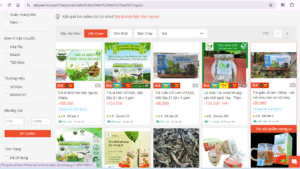

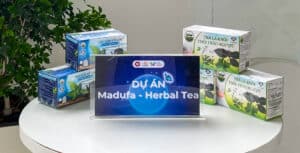


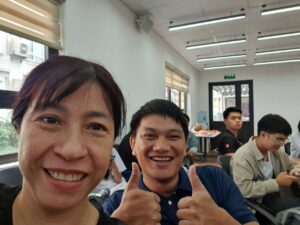



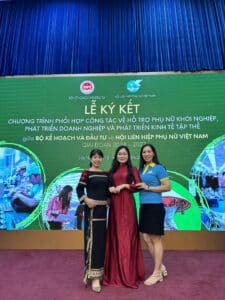

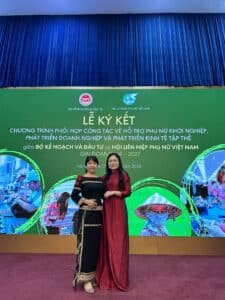
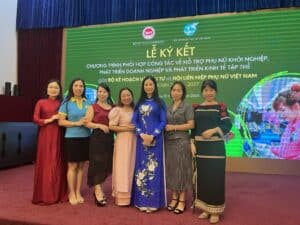
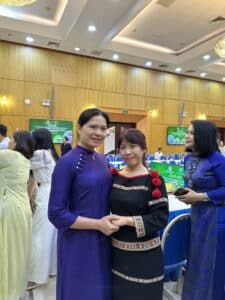









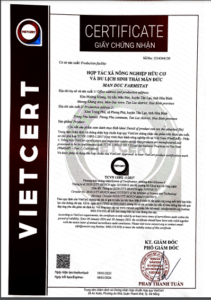
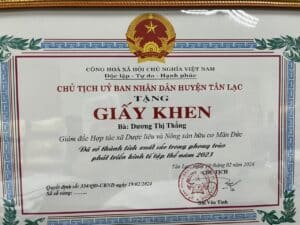
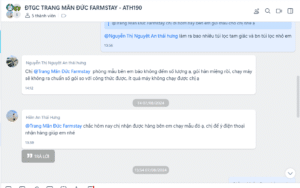

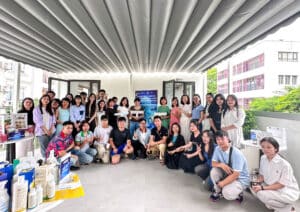






























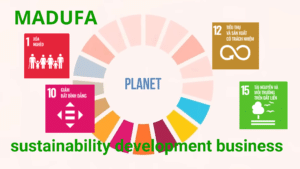
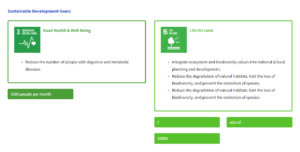
https://drive.google.com/file/d/1j8RzjzWsL2q-jIFYoIuEDw2Ir8s7Lswk/view?usp=sharing

A1. Madufa – Herbal Tea- Nurture nature, safeguard health, empower communities
Madufa – Herbal Tea is a venture to have a positive impact on the world. We have Impact Plan that system trying to influence as well as measure what we actually making a change.
MADUFA a project of growing medicinal herbs under the forest canopy in the mountainous district of Tan Lac, Hoa Binh province. We guide ethnic minorities to grow and process into healthy products.
What we are doing
Growing medicinal herbs under the forest canopy
Coach ethnic minorities to grow and process medicine plant
Enhance people health by using medicinal herbs
A2. Recently, at the national scientific conference combining Eastern and Western medicine in the diagnosis and treatment of gastroesophageal reflux disease and other digestive diseases held on July 31, Associate Professor, Dr. Dau Xuan Canh, Chairman of the Vietnam Oriental Medicine Association, said that this disease is increasingly becoming a disease of the times.
According to statistics, about 7 million Vietnamese people suffer from gastroesophageal reflux, of which about 60% of patients do not receive timely treatment, leading to dangerous complications such as esophageal stenosis, esophageal cancer, etc.
Meanwhile, the treatment of this disease requires perseverance, combined with lifestyle changes. “In treatment, studies show that the combination of the advantages of modern medicine and traditional medicine has brought high efficiency, reducing the risk of recurrence in the treatment of digestive diseases, especially gastroesophageal diseases. Madufa Herbal tea with LA KHOI Tea is an effective solution to support the treatment of this disease
Vietnam is a tropical country with a large forest area. In order to develop the economy, people often clear forests to grow fruit trees or industrial trees such as timber, rubber, or for the textile industry. After harvesting the trees, they will burn them to eliminate pests and diseases. At that time, floods can easily occur, wash away fertile soil, and kill countless creatures as well as emit co2 gas, warming the atmosphere. The tree planting project under the forest canopy helps solve problems related to climate change
United Nations sustainability development goals
Madufa have an impact on, either directly or indirectly include:
Eliminate Poverty
Establish Good Health and Well-Being
Grow Affordable and Clean Energy
Create Decent Work and Economic Growth
Influence Responsible Consumption and Production
Organize Climate Action
A3. Solution effectiveness and ESG integration
Describe how you address the target social/environmental issues and report your effectiveness according to environmental, social, and governance (ESG) criteria.
Solution Design and Intended Impact: Madufa Herbal Tea was conceived with a dual purpose: to generate profits and to create significant social and environmental impacts. The core social issue we address is the health and wellness of communities, particularly focusing on providing natural and accessible solutions for common health issues through herbal remedies. The environmental focus is on sustainable agriculture practices, especially in the cultivation of herbs. By integrating local knowledge and modern processing techniques, we ensure that the root causes of unsustainable farming and poor health awareness are directly addressed.
you’ve created your venture to have a positive impact on the world. Crafting your Impact Plan will help you clarify what system you’re a part of, how you’re trying to influence it, as well as how you will measure that you’re actually making a change.
Logical Positioning in the Solution Landscape: In the broader solution landscape, Madufa Herbal Tea occupies a unique position by blending traditional herbal medicine with modern business practices. This combination is logical because it taps into a growing global trend toward natural health products while supporting local economies and sustainable farming practices. The use of local resources and knowledge not only ensures product authenticity but also empowers communities, making our solution sustainable and community-centered.
Integration of ESG Practices: Our strategy is firmly rooted in Environmental, Social, and Governance (ESG) criteria:
• Environmental: We promote sustainable farming practices, reducing the carbon footprint of our operations by sourcing herbs locally and supporting reforestation initiatives. We also minimize waste through eco-friendly packaging solutions.
• Social: We invest in local communities by providing fair wages, education, and training to farmers. We also focus on improving public health by offering affordable, natural health solutions.
• Governance: Madufa Herbal Tea adheres to ethical business practices, ensuring transparency and accountability in all operations. We regularly audit our supply chain to maintain high standards of environmental and social responsibility.
B. Madufa Herbal Tea: Strategy for Accelerating Social Impact
B1. Expanding Geographic Impact: Madufa Herbal Tea is committed to expanding its social impact through a geographically targeted strategy with specific goals.
• Reducing Carbon Emissions: Over the next 3 to 5 years, Madufa aims to significantly reduce carbon emissions by expanding herb cultivation areas according to organic farming standards and utilizing renewable energy in production processes. Processing centers will be established in various regions of Vietnam to optimize the supply chain and minimize transportation.
• International Expansion: We will collaborate with technology and capital partners to expand into international markets with high demand for natural and organic products. This strategy includes replicating successful initiatives in Vietnam across other global regions, thereby reducing global emissions and enhancing social impact.
• Compelling Expansion Strategy (Score: 2): This strategy is compelling as it not only extends geographic reach but also contributes to solving global environmental issues while maintaining sustainability and growth.
2. Deepening Impact: Madufa focuses on deepening its impact by improving community livelihoods and promoting social equity.
• Improving Livelihoods: We will continue investing in training and support programs for farming communities, helping them enhance sustainable farming skills and access higher-value markets. This will improve livelihoods and create new economic opportunities for communities.
• Promoting Social Equity: Madufa is committed to promoting social equity by ensuring that all stakeholders, from farmers to workers, benefit fairly from the value chain. We will also implement education and healthcare support programs for communities, creating positive and sustainable change.
• Compelling Deepening Strategy (Score: 2): This strategy is compelling because it not only focuses on scaling but also ensures that deep and sustainable impacts are created in the communities Madufa serves.
3. Clear and Logical Roadmap: Madufa has developed a clear and logical roadmap to achieve its goals for accelerating social impact.
• Year 1-2: Strengthen presence in Vietnam by expanding cultivation areas and upgrading processing facilities. Begin collaborating with technology partners to reduce carbon emissions in production.
• Year 3-4: Expand into international markets while implementing initiatives to improve livelihoods and promote social equity. Start replicating successful initiatives in new regions, leveraging support from capital and technology partners.
• Year 5: Complete international market presence, solidifying the Madufa brand as a sustainable and responsible herbal product provider. Continue expanding positive environmental and social impacts.
• Clear and Logical Roadmap (Score: 2): This roadmap is clear and logical, ensuring that environmental, social, and governance (ESG) goals are integrated into Madufa’s impact acceleration strategy.
With such a strategy and roadmap, Madufa Herbal Tea not only accelerates social impact but also ensures that sustainable goals are comprehensively and effectively achieved.
B2. Ensuring Long-Term Financial Stability and Profitability at Madufa Herbal Tea
1. Solid Economic Model: Madufa Herbal Tea operates on a robust and diversified business model that balances profitability with social and environmental impact.
• Diversified Revenue Streams: Our revenue model includes the sale of herbal teas, wellness products, and value-added services like health education and sustainable farming workshops. This diversification ensures that we are not overly reliant on a single income stream, making our business more resilient to market fluctuations.
• Cost Efficiency: By sourcing raw materials locally and utilizing sustainable farming practices, we reduce operational costs while also enhancing product quality. Our vertically integrated supply chain, from cultivation to processing and distribution, further improves cost control and profit margins.
• Solid Economic Model: This model is solid because it combines multiple revenue streams with cost-efficient practices, ensuring a steady flow of income and reducing dependency on external factors.
2. Strong Returns on Investment (ROI): Madufa is committed to delivering strong returns on investment through strategic growth and operational efficiency.
• Scalable Growth: Our strategy to expand both geographically and in product offerings ensures that we can capture larger market shares over time. As we grow, economies of scale will allow us to improve margins and increase profitability.
• High-Value Market Positioning: By positioning Madufa as a premium brand in the natural and organic products market, we can command higher prices for our products, thereby enhancing profitability. Our focus on quality and sustainability also builds brand loyalty, leading to repeat customers and long-term revenue.
• Strong ROI: Our approach to scaling the business, coupled with premium market positioning, ensures that investors can expect strong and sustainable returns.
3. Addressing Critical Risks: Madufa Herbal Tea has identified and proactively managed key risks to ensure financial stability.
• Market Risk: To mitigate market risks, we conduct continuous market research to adapt our product offerings and marketing strategies to changing consumer preferences. Our international expansion strategy also diversifies market exposure, reducing reliance on any single region.
• Supply Chain Risk: We have built strong relationships with local farmers and invested in supply chain infrastructure to minimize disruptions. By supporting sustainable farming practices, we also reduce the risk of raw material shortages or price volatility.
• Regulatory Risk: We ensure compliance with all relevant regulations and standards in the markets we operate in. By staying ahead of regulatory changes, we minimize the risk of fines, sanctions, or market exclusion.
• Well-Addressed Risks: By addressing these critical risks through proactive management and strategic planning, we ensure that Madufa Herbal Tea remains financially stable and resilient in the long term.
B3 Team and leadership
Team Expertise and Leadership Capability at Madufa Herbal Tea
1. Strong Fit Between Team Capacities and Project Requirements: Madufa Herbal Tea’s team is composed of individuals with expertise that perfectly aligns with the project’s dual objectives of profitability and social impact.
• Leadership in Sustainable Business: Our leadership team includes seasoned professionals with extensive experience in sustainable business practices and social entrepreneurship. Their ability to balance financial performance with social responsibility ensures that the project remains profitable while making a positive impact.
• Herbal Medicine Expertise: Our team includes experts in traditional herbal medicine and modern health sciences, ensuring that our products are both effective and aligned with market trends. This expertise is crucial in developing high-quality, health-promoting products that resonate with our target audience.
• Supply Chain and Operations: We have team members who specialize in sustainable agriculture, supply chain management, and operations. Their knowledge ensures that our supply chain is efficient, cost-effective, and environmentally friendly, which is key to maintaining profitability while supporting local communities.
• Strong Fit: The alignment between our team’s skills and the project’s needs is strong, providing the necessary expertise to successfully achieve both profitability and social impact.
Compelling Human Resource Strategy:
• From our core values: Love, Sincerity, and Efficiency, Madufa seeks proactive individuals who fully unleash their creativity.
• Flexible HR Strategy: This includes full-time, part-time, and intern positions.
• We emphasize local engagement. Our workforce is made up entirely of local employees, recruited 100% from Tân Lạc, Hòa Bình, and they are consistently nurtured and trained to meet managerial roles.
B4. Partnership and collaboration
Partnership and Collaboration at Madufa Herbal Tea
1. Proactive Stakeholder Engagement: Madufa Herbal Tea leverages a proactive approach to engage with stakeholders, ensuring that our partnerships amplify our social impacts.
• Stakeholder Engagement: We actively engage with a wide range of stakeholders, including local communities, suppliers, customers, and environmental organizations. By fostering open communication, we gather valuable feedback that helps us refine our business operations and enhance our social impact.
• Continuous Improvement: We integrate the lessons learned from these interactions into our operations, ensuring that our business remains responsive to the needs and challenges of our stakeholders. This approach not only strengthens our relationships but also enhances our ability to deliver on our social objectives.
2. Committed and Capable Partners: Madufa collaborates with partners who have strong capacities to support and enhance the project’s performance.
• Strategic Alliances: We partner with organizations that share our commitment to sustainability and social impact. These partners bring valuable expertise, resources, and networks that help us scale our operations and maximize our impact.
• Capacity Building: Our partners are not just collaborators; they are integral to our success. Their strong capacities in areas such as technology, finance, and market access provide the support needed to push our project’s performance to new heights.
In summary, Madufa Herbal Tea uses a strategic approach to partnerships and collaborations, engaging stakeholders proactively and working with committed partners to amplify our social impacts and drive project success.
C1. Measurement and reporting (ESG)
Measuring and Reporting Impacts According to ESG Criteria at Madufa Herbal Tea
1. Focus on Key ESG Issues: Madufa Herbal Tea’s impact reports are carefully designed to address the environmental, social, and governance (ESG) issues that are most important to both the organization and its stakeholders.
• Materiality Assessment: We conduct regular materiality assessments to identify the ESG issues that have the greatest significance to our business and stakeholders. This ensures that our reports focus on the areas where we can have the most substantial impact, such as sustainable sourcing, community development, and ethical governance practices.
• Targeted Reporting: By focusing on these critical ESG issues, we provide clear and relevant information that helps stakeholders understand how we are addressing the most pressing challenges in our operations and communities.
2. Detailed and Transparent Disclosure: Madufa maintains a high level of detail and transparency in its ESG reporting, openly sharing both successes and areas for improvement.
• Comprehensive Data Disclosure: Our reports include detailed data on our environmental performance (e.g., carbon emissions, waste reduction), social impact (e.g., community engagement, employee well-being), and governance practices (e.g., compliance, ethical standards). We are committed to transparency, and we disclose not only our positive outcomes but also areas where we need to improve.
• Stakeholder Communication: We actively communicate these findings with our stakeholders through various channels, including annual reports, community meetings, and digital platforms. This openness helps build trust and ensures that our stakeholders are fully informed about our ESG performance.
3. Ensuring Data Accuracy: Madufa employs strong measures to ensure the accuracy of the data presented in its ESG reports.
• Third-Party Verification: To maintain the integrity of our reporting, we engage third-party auditors to verify the accuracy of our ESG data. This independent review process ensures that the information we present is reliable and trustworthy.
• Internal Controls: We have robust internal controls and data management systems in place to collect, monitor, and analyze ESG data. These systems help us track progress, identify trends, and make data-driven decisions to enhance our impact.
In summary, Madufa Herbal Tea’s approach to ESG reporting is focused, detailed, and transparent. We prioritize the ESG issues that matter most, provide comprehensive and honest disclosures, and ensure the accuracy of our data through rigorous internal and external checks. This commitment helps us build credibility with our stakeholders and continuously improve our impact.
C2. Compliance with ESG Standards and Frameworks at Madufa Herbal Tea
1. Adoption of Relevant ESG Standards and Frameworks: Madufa Herbal Tea carefully selects ESG standards and frameworks that are highly relevant to our industry, operational footprint, and the expectations of our stakeholders.
• Industry-Relevant Standards: We adhere to standards such as the Global Reporting Initiative (GRI) and the Sustainability Accounting Standards Board (SASB), which are tailored to the agricultural and food production industries. These frameworks guide us in measuring and reporting our environmental, social, and governance impacts in a way that aligns with industry best practices.
• Operational Footprint Consideration: Given our focus on sustainable farming and community development, we also follow frameworks like the United Nations Sustainable Development Goals (SDGs) and the Rainforest Alliance Certification. These frameworks are particularly relevant to our operations, helping us track and improve our contributions to global sustainability and social equity goals.
• Stakeholder Expectations: We actively engage with our stakeholders to understand their expectations regarding ESG practices. This engagement ensures that the standards and frameworks we adopt not only meet regulatory requirements but also resonate with our customers, partners, and communities.
2. Understanding of Legal and Regulatory Requirements: Madufa Herbal Tea maintains a strong understanding of the current state and future trends in legal and regulatory ESG reporting requirements across the jurisdictions where we operate.
• Current Compliance: We stay up-to-date with the ESG reporting requirements in Vietnam and other markets where we plan to expand. This includes compliance with local environmental regulations, labor laws, and governance standards, ensuring that our operations meet or exceed legal expectations.
• Future Trends Awareness: We closely monitor emerging trends in ESG regulations, both locally and globally. This proactive approach allows us to anticipate changes in the regulatory landscape and adjust our practices accordingly. By doing so, we ensure that we remain compliant and continue to lead in ESG performance as standards evolve.
D
Insights Gained from Fieldwork and Project Improvement at Madufa Herbal Tea
1. Clearly Articulated Key Lessons: Our fieldwork has provided us with invaluable insights that have significantly influenced the direction of Madufa Herbal Tea.
• Understanding Community Needs: One of the key lessons learned is the importance of deeply understanding the specific needs and challenges faced by the local communities we work with. This insight has helped us tailor our support programs, ensuring they are more relevant and effective.
• Sustainable Farming Practices: We have also learned that promoting sustainable farming practices requires continuous education and hands-on support. Simply providing resources is not enough; farmers benefit most when they receive ongoing training and are actively involved in the development of these practices.
• Market Adaptation: Another critical lesson is the need to remain adaptable in our market strategy. Consumer preferences in herbal products can shift quickly, and our fieldwork has underscored the importance of staying responsive to these changes by regularly updating our product offerings.
2. Profound Lessons: The lessons we have learned from the fieldwork are not just operational tweaks but profound insights that have reshaped our approach.
• Empowerment through Participation: We realized that empowering communities through active participation in decision-making processes leads to more sustainable outcomes. When community members have a say in the projects that affect them, they are more committed to ensuring the success of those initiatives.
• Long-Term Impact Focus: Another profound lesson is the importance of focusing on long-term impacts rather than short-term gains. Our fieldwork has shown that sustainable change takes time, and our strategies must be designed to support gradual but lasting improvements in environmental and social conditions.
• Holistic View of Success: We’ve learned that true success in our project is not just measured by profitability but also by the well-being of the communities we serve and the health of the environment. This holistic perspective has become central to how we define and pursue success.
3. Sensible Improvement Strategy: Based on these lessons, we have developed an improvement strategy that makes good sense and is aligned with our mission.
• Enhanced Community Engagement: We are enhancing our community engagement by setting up local advisory boards in each area where we operate. These boards will consist of community members who provide regular feedback and help shape our initiatives, ensuring they are more closely aligned with local needs.
• Strengthened Training Programs: We are expanding our training programs to include more hands-on workshops and long-term mentorship for farmers. This approach will help solidify sustainable farming practices and improve the livelihoods of our partner communities.
• Agility in Product Development: We are adopting a more agile approach to product development, with regular market research cycles to stay ahead of consumer trends. This strategy will allow us to innovate quickly and ensure our products remain relevant and desirable.
In conclusion, the key lessons we’ve learned from fieldwork are clearly articulated and profound, leading to a well-thought-out improvement strategy. This strategy is designed to enhance our project’s impact, making Madufa Herbal Tea more effective in achieving its dual objectives of profitability and social impact.

